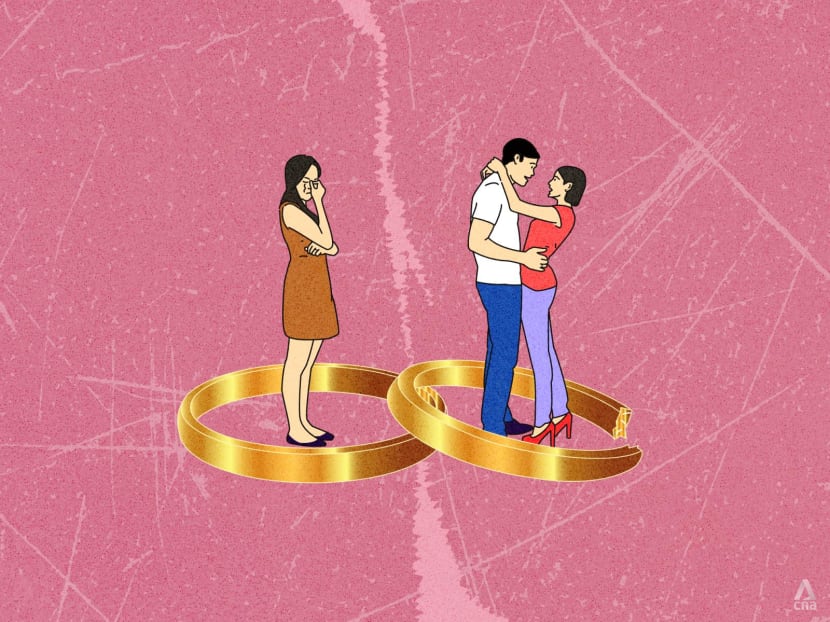'Things were not the same anymore': After one partner cheats, can a relationship truly be saved?
After an affair, many factors can affect a couple's decision to split up or stay together. How both partners respond after the betrayal is key, relationship counsellors said.

Infidelity is a topic that is still widely considered to be taboo or shameful, but relationship counsellors said it is more common than we may think. (Illustration: �鶹��ý/Samuel Woo)

This audio is generated by an AI tool.
Mr and Mrs Tan (not their real names) had been married for about five years when she started receiving messages from an unknown individual in early 2024 detailing an affair that he was having with his colleague.
When she confronted her husband about it shortly after, he admitted to it.
Mrs Tan, 37, a manager at a corporate firm, said: “The first reaction was shock ... Following that, there was resentment, anger and sadness that we have lost a part of our relationship. Things were not the same anymore."
She had never once doubted him even though he often stayed out late drinking. She had believed that her husband, who is manager at another corporate firm, just needed to relieve stress.
For Mr Tan, 35, the extramarital affair was a form of escapism. He struggled with negative feelings and couldn't bring himself to discuss them with his wife, instead resorting to alcohol. This led to him turning to another woman to satisfy his physical needs in an affair that lasted over a year.
Relationship counsellors told �鶹��ý TODAY that infidelity is rather common among married couples, be it emotional, physical or online cheating. Yet, couples can find it too painful or shameful to discuss the affairs openly, even if they want to fix their relationship.
This begs the question – can a relationship survive infidelity? When is it worth mending the relationship and when is it better to call it quits?
DISTANCE LEADS TO INFIDELITY
In truth, adultery is rarely a hasty act.
Experts said that it often starts from a gradual breakdown in a couple's relationship after trust and emotional closeness are weakened.
Associate counsellor Beverly Foo from The Lighthouse Counselling, which provides couples' therapy and marriage counselling among other services, said that Singapore couples often juggle high-pressure careers and childcare responsibilities.
With so many demands on their time and energy, couple time is usually the first thing sacrificed. As intimacy wanes, the relationship can then start to feel like a source of stress instead of support.
“As that distance grows, one or both partners may begin to invest less in the relationship," Ms Foo added. "Resentment builds, appreciation fades and attention shifts to what is lacking rather than what is present."
As one or both parties begin to feel more emotionally neglected or vulnerable, boundaries with other people may start to blur. A connection with someone outside the relationship can feel rewarding. Over time, the person may permit themselves to cross a line.
Relationship coach Winifred Ling from mental health clinic Promises Healthcare said that often, the workplace is the most convenient and accessible environment for this to happen.
"Initially, (casual) encounters might seem harmless but once a boundary is crossed, it becomes easier to deceive and lie," she added.
Ms Tammy Fontana, relationship counsellor at All in the Family Counselling Centre, stressed that infidelity is not always about an individual's moral failings and can often be a symptom of underlying issues within the relationship.
It can also stem from a lack of emotional development and maturity, or mental health challenges such as depression, unresolved trauma or addiction issues.
Additionally, the experts said that societal stigma often discourages couples from speaking openly about infidelity, a topic that's still widely considered to be taboo or shameful.
This certainly rings true for Mr and Mrs Tan, who have not disclosed their difficulties to anyone outside of their immediate families and the reason why they did not want to be identified for this interview.
Couples therapist Lieu An An from therapy provider The Psychology Atelier said that Singapore’s strong emphasis on family stability and social image could play a part in pressuring couples to “keep things together” even after such a betrayal.
Couples therapist Winny Lu Aldridge from Just2Hearts Counselling said that cultural beliefs and values can also make many couples reluctant to "air dirty laundry in public", leading them to struggle in isolation. This may also mean that they do not receive the support and guidance they need, which can in turn worsen the emotional damage.

WHEN IS THE RELATIONSHIP WORTH SAVING?
When one partner cheats, does that automatically spell the end of the relationship?
Not quite, the experts said.
Many practical concerns can affect how individuals and couples weigh this dilemma – for instance, if young children are involved or if one spouse is financially dependent on the other.
However, what often determines the outcome is not the nature of the betrayal itself, but rather how both partners respond afterwards.
Ms Foo said: "If the unfaithful partner takes full responsibility, ends the affair completely and demonstrates genuine remorse – not just in words but through consistent and trustworthy actions – there is often a foundation to rebuild upon."
Likewise, the betrayed partner needs to feel emotionally safe enough to stay open to the healing process, she added.
This was the case for Mr and Mrs Tan. She eventually decided to give him another chance on account of their two young children, but also because Mr Tan took responsibility for his misdeeds by apologising sincerely, ending the affair and seeking her forgiveness, even cutting off communication with the other woman.
“Without any of these factors, I think it would be hard for us to move on,” Mrs Tan said.
Even in the wake of an affair, the couple may still share a strong emotional connection, history or mutual respect, Mrs Aldridge from Just2Hearts Counselling said.
If the unfaithful partner takes full responsibility, ends the affair completely and demonstrates genuine remorse – not just in words but through consistent and trustworthy actions – there is often a foundation to rebuild upon.
However, some individuals may feel that staying with their partner after such a betrayal would compromise their emotional integrity or core values, Ms Foo said.
One such person is Ms Willynn Ng, 37, who left her partner after he cheated on her twice. The regional head of a dating application said: “There comes a point when you’ve given someone chance after chance and they make it painfully clear that they love themselves more than they ever loved you.
“When they repeatedly prioritise their own desires over your mental and emotional well-being, you realise that the only person left to choose you is you.”
Ms Ng also asked herself what staying with her unfaithful partner would signal to her four children. Would she be "normalising" the notion of betrayal in close relationships for them? "That’s a legacy I refuse to leave behind."
The betrayed parties may be more inclined to separate if they are financially independent or if they already have strong social and family support outside of their partners, Mrs Aldridge said.
There is often no single deciding factor outweighing all else, but Ms Ling from Promises Healthcare believes that splitting up can be the best option when conflict between a couple is negatively affecting their children or when only one partner is still invested in making the relationship work.
THE LONG JOURNEY TO HEALING
How, then, can a broken relationship ever truly be healed?
At the outset, the immediate priority should be allowing intense emotions such as anger and hurt to settle, Ms Lieu from The Psychology Atelier said.
It could be good for couples to agree upon a short break from each other – even a few hours of space helps to prevent negative escalation.
Major decisions such as separation or retaliation should be held off until emotions have cooled.
To provide some stability during this emotional upheaval, the couple could also ask trusted family or friends to help with household duties such as childcare, Mrs Aldridge recommended.
The next step: transparent conversations between the couple, which might take place over a few sessions.
Both partners should be prepared to express feelings and needs that may have gone unattended for a long time, Ms Lieu said. In particular, the cheating partner has to be ready and willing to answer questions honestly.
Such conversations can easily become confrontational and heated, so it is important to pace this process.
In navigating this stage, couples should also consider reaching out for community support from loved ones or even professional help, as Mr and Mrs Tan did in seeking out a relationship counsellor.
“A trained couples therapist could be very helpful to add structure to talk about tricky topics,” Ms Lieu added.
Finally, both partners need to commit to re-establishing trust.
This involves negotiating clearer boundaries and reaffirming the shared values at the core of their relationship, Ms Lieu said.
For instance, the unfaithful partner could proactively provide access to their personal devices and social media accounts for transparency, Ms Ling suggested.
They should also take care to be responsive to their spouse and to avoid keeping secrets or telling lies, even small ones.
In the case of Mr Tan, upon ending his affair, he made concerted efforts to change behaviours that had previously led their relationship to harm.
Whenever he went out, he would limit himself to two drinks, update his wife on his location and return home by 10pm if she requested it of him.
He also began setting aside time to check on his wife's emotional well-being or needs every day. He said it has helped the couple to create a consistent space for open sharing, where they feel safe to "voice out any negative feelings".
Partners should not expect each other to "move on quickly", Ms Ling warned.
Instead, it is important for the cheating partner to validate the hurt they caused their partner, express remorse and sit with the discomfort.
Be careful not to lose patience, but to allow each other to grieve and process, the relationship coach advised.
The unfaithful partner could also initiate activities that allow the couple to create new memories together. Persist in these efforts even if the hurt partner initially rejects them – not to badger them, but to show sincerity.
More importantly, couples should not force or expect the relationship to revert to how it was before. “Sustainable healing means collaborating to create a new normal marked by clearer agreements, richer communication and deeper emotional honesty," Ms Lieu said.
“Many couples might report feeling a more nuanced and enriched emotional connection ultimately – not because of the affair itself, but because of the intentional work that followed it.”
Mr and Mrs Tan certainly agreed. Now, more than a year after their mutual decision to salvage their marriage, they said that their reforged relationship is stronger than ever.
She said: “In the past, when we spent time (together) as a family, he was always on the phone, thinking about something else. You could sense that he didn’t really want to be there.
“Now, you can tell that he’s truly present. His phone is aside. He’s playing with the kids. He sees me differently and is more appreciative of the little things that I do."
Mr Tan said that overcoming that challenging period together means that the family now feels more confident and able to confront whatever is thrown at them in future.
His biggest revelation: "Nothing else matters to me. My career doesn’t matter, my job doesn’t matter and money doesn’t matter – as long as we stay together."


.jpg?itok=wNPcWw_x)
.jpg?itok=6I4ZtfyH)







